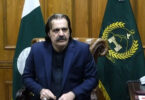ISLAMABAD (APP): Council of Islamic Ideology (CII) Chairman Dr Qibla Ayaz on Tuesday termed the former Prime Minister’s Special Representative for Interfaith Harmony and Middle East Hafiz Tahir Mehmood Ashrafi a strong voice for religious harmony.
Highlighting unwavering efforts for the promotion of interfaith harmony, Dr Qibla, in an exclusive talk to APP, said Ashrafi who is also the chairman of Pakistan Ulema Council, had always voiced for the legal rights of minorities and helped them in critical times either it was Rimsha Masih or Joseph Colony cases. He also eulogized the Ashrafi’s significant role during the Organization of Islamic Cooperation’s summits saying that he, due to his interpersonal relationships with the leadership of Muslim world, helped in bringing all Muslim countries together twice in the period of three months here in Islamabad.
He said Ashrafi wanted to unite all Muslim countries at one platform in a bid to make combined efforts to cope with the prevailing challenges being faced by the Muslim Ummah on the globe.
Regarding his upcoming trip to Saudi Arabia with the incumbent set up, Dr Qibla said it would pave the way to further strengthen the bilateral ties between the two countries.
Meanwhile, National Council for Minorities Member Albert David, sharing his personal working experience with Hafiz Tahir Mehmood Asharfi, said he had always provided him a supportive hand in case of handling some sensitive issues pertaining to minorities.
“Mishandling of such critical issues could bring a bad name to Pakistan but Tahir Ashrafi with his pragmatic approach helped resolve them amicably,” he added.
Albert said Ashrafi had spoke out his mind boldly at many an occasion regarding the legal rights of minorities that was an encouraging step towards bridging the gap between the majority and minority populations of the county.
He said the successful visit of Archbishop of Canterbury Justin Welby was a big contribution of Tahir Ashrafi towards religious harmony and it had portrayed a soft image of Pakistan worldwide.
He expressed the hope that if he could work with this legend once again in his life to bring reforms and to transform such a society which should be free of colour, caste and creed.






